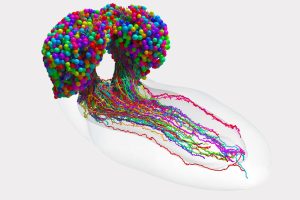Joshua Vogelstein, an assistant professor of biomedical engineering, is a leader in harnessing statistical machine learning and cloud-computing technologies to enable the storage, exploration, analysis, and modeling of large-scale neuro data that allows biologists, clinicians, and engineers to address theories of brain function and dysfunction. Joshua is also a member of the Data Science and AI Institute.
Today, the ability to acquire data on human health across multiple Spatio-temporal scales is unprecedented, as is the challenge of analyzing that wealth of data. Vogelstein’s research focuses on understanding how massive biomedical data sets are best analyzed to discover new knowledge about the function of living systems in health and disease, and how this knowledge can be harnessed to provide improved, more affordable health care. He serves as principal investigator (PI) or co-PI for numerous grants from the National Science Foundation, National Institutes of Health, Defense Advanced Research Projects Agency (DARPA), and industry.
As director and co-founder of the NeuroData lab at Johns Hopkins, one of Vogelstein’s areas of study is connectome coding, an emerging field representing a shift from the traditional study of neural coding. A connectome is a specific, cell-to-cell mapping of axonal tracts between neurons or networks of the brain. Vogelstein theorizes that brain structure, rather than brain activity, is the missing link between the genome (the set of all genes) and desired behaviors. The statistical models he is creating will guide essential investigations into neural circuit mechanisms, how they work, how they fail, and how they can be improved.
Recognized across Hopkins, academia, and industry for his expertise, Vogelstein holds joint appointments in the Johns Hopkins’ departments of Applied Mathematics and Statistics, Computer Science, and Neuroscience. He is affiliated with several institutes and centers at Johns Hopkins, including the Institute for Computational Medicine, Center for Imaging Science, Human Language Technology Center of Excellence, Institute for Data-Intensive Engineering and Sciences, and the Kavli Neuroscience Discovery Institute. He directs the Department of Biomedical Engineering’s biomedical data science focus area for graduate students, collaborating with the departments of Anesthesiology and Critical Care Medicine, Neurology, Neurosurgery, and Psychiatry to train students to develop innovative cloud-based technologies and data analysis methods to improve the diagnosis and treatment of disease.
In addition to his extensive service at Johns Hopkins, Vogelstein is a visiting scientist for Howard Hughes Medical Institute and serves on the advisory boards for Mind-X and PivotalPath. In addition, he co-founded gigantum, an open-source platform for developing, sharing, and extending data-driven science, and d8alab, a statistical and data science consulting firm.
He is an editor for Neurons, Behavior, Data Analysis, and Theory, and has served as a guest associate editor for PLoS Computational Biology.
Vogelstein serves as a reviewer for numerous journals, including the Annals of Applied Statistics, IEEE Global Conference on Signal and Information Processing (GlobalSIP), Frontiers in Brain Imaging Methods, Journal of the Royal Statistical Society B (JRSSB), Nature Communications, Nature Methods, Nature Reviews Neuroscience, Network Science, Neural Computation, PLoS One, Current Opinion in Neurobiology, and many others.
Published widely and highly cited, Vogelstein presents frequently and helps lead and organize conferences in the field. Most recently, he organized the 2017 NeuroStorm Workshop and 2016 Global Brain Workshop, and co-organized the BigNeuro2015: Making Sense of Big Neural Data Workshop at Neural Information Processing Systems (NIPS) and the 2012 Scaling up EM Connectomics Conference.
He received his BA in Biomedical Engineering from Washington University in St. Louis in 2002, his MS in Applied Mathematics and Statistics from Johns Hopkins University in 2009, and his Ph.D. in Neuroscience from the Johns Hopkins School of Medicine.


